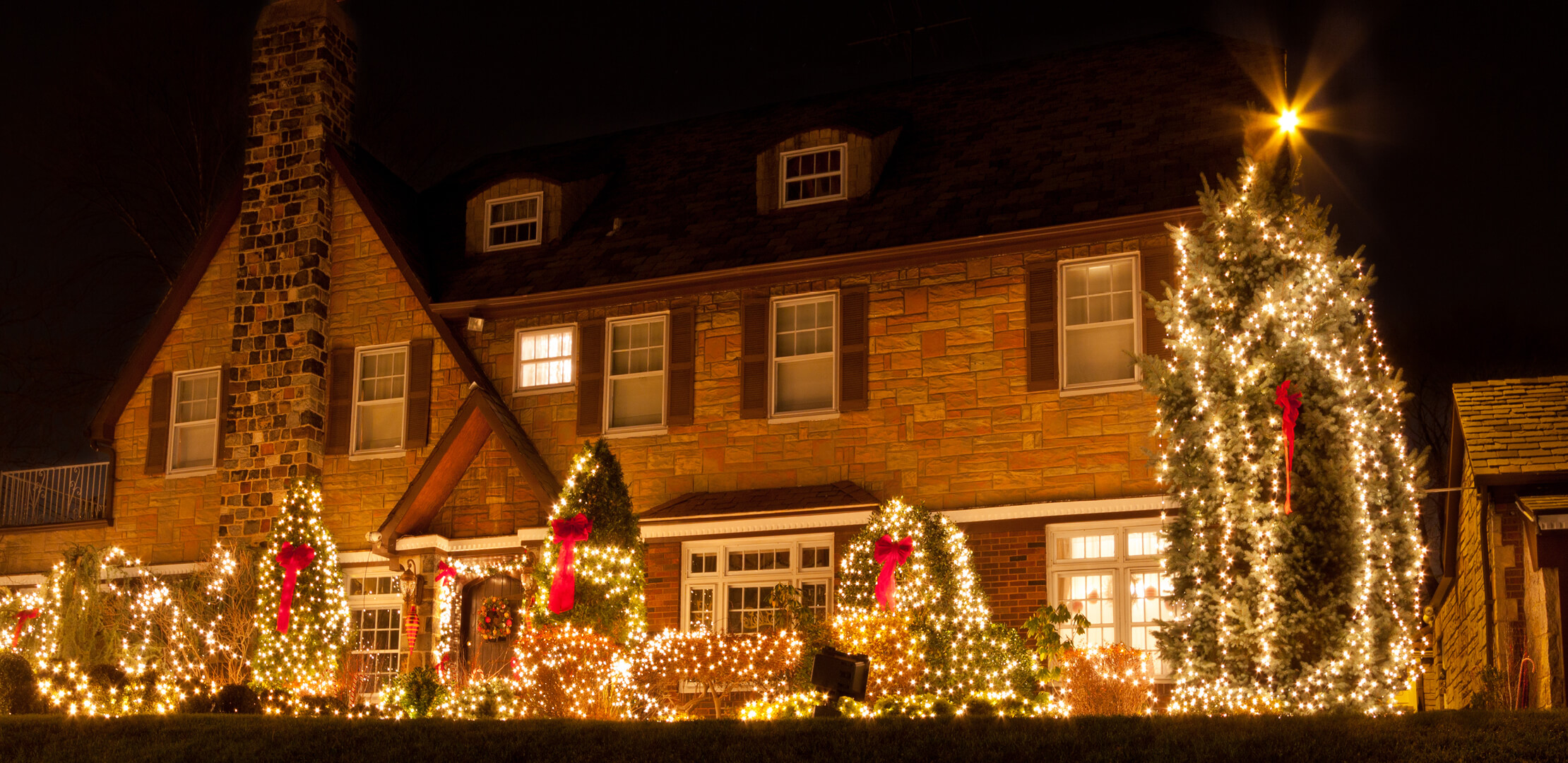Holiday Lighting
LED vs. regular incandescent bulbs? One of our clients used an energy meter to measure the 150 bulb colored light strand that they normally used in their home. The verdict? A staggering 1050 watts! With the new LED bulbs, a 150 bulb colored light strand measured only 15 watts.
Today’s LED bulbs come in “warm white” if you prefer the more traditional look. The colored and cool white bulbs are vibrant, and the shapes and sizes are much more varied than regular incandescent lights. Plus, you can string many more strands together since the wattage is less. Please note: be aware that Lights made in China and other foreign countries should be avoided because there are no restrictions against the use of lead in consumer products. Lights that are manufactured in the United States are likely to contain smaller amounts of lead.
If you have any concerns about how the various lights will look, stop by your local retailer. On the North Shore, Millen Hardware has all the lights displayed so you can look before you buy. Or, give Get Dwell a call and we would be happy to help you with your lighting design.
A Note on Recycling: Be kind to the environment! Recycle your unwanted holiday light strands rather than discarding them in a trash bin destined for landfill. More and more municipalities are doing their part. Beginning the first week in December, there will be a holiday light recycling bin at the Wilmette Public Works Dept site, and another one at the Wilmette Village Hall.
Gutters, Gutters, Gutters
Keep in mind that if your gutters are not clean before the leaves fall, you may be headed for some water trouble as fall storms roll in. Now is the time to get your gutters, downspouts and external watershed system analyzed before fall thunderstorms lead to sudden water events that can cause serious problems.
In the past, Get Dwell was hesitant to recommend any gutter guards, which are designed to keep leaves and other natural debris out of gutters, primarily because our clients have had mixed results. The most significant drawback was that during a large rain, water could glide or shed over some guards. This could lead to flooded window wells, basement flooding and water against the foundation, among other things. But for the last few years we have been analyzing and testing a tough, attractive product that we feel confident can protect your home and stand up to Chicago’s weather extremes. Learn more about our gutter guard installation service here.
Ladder Safety
Some 222,000 people end up in the emergency room every year due to ladder-related injuries.
“The number of emergency room visits from ladder-related injuries totals more than those for lawn mowers and home workshop saws combined,” warns John Drengenberg, Manager of Consumer Affairs at Underwriters Laboratories Inc., Northbrook, IL, a not-for-profit product safety testing organization.
At Get Dwell, we see this kind of injury firsthand every year. The fact is, once you reach the age of 35 to 40 you increase your chances of a ladder injury or fatality. As we age, our core strength diminishes, our sense of balance is not what it used to be, our reaction times slow and a sense of vertigo is more likely. It can be a deadly combination. Please be careful out there and if you have any doubts about your capabilities, please leave the gutter cleaning or other outside ladder work to professionals.
Storm Windows — a Realization!
Finally — you don’t have to take storm windows on and off every year, thanks to an ingenious product from SpencerWorks. It provides the look of traditional storms but has a hidden screen, which is opened in the warmer weather. This product is perfect for homeowners who don’t like the look of triple-track windows on their exterior. Call us or contact SpencerWorks for more information on this beautiful, functional and money-saving storm window.
Keep Your Basement Dry
Some basements need professional waterproofing and for these we offer our Basement Waterproofing & Foundation Assessment. We’ll review your entire property, including your basement, and will let you know where you are susceptible to additional flooding and what you can do to mitigate any potential risks. We also install sump pumps and backup systems once it’s been determined that that is necessary for your basement.
For other basements, you need to understand the basics of how and why a basement floods and what you can do about it. In order to keep your basement dry, it’s important to do the following:
- Check all areas where the foundation wall has been compromised — window well, stairs below grade are excellent areas to start. Make sure those areas and drains are clear and protected. We recommend specialized domed drain covers on these drains because we have been called to more than one flooded basement where an errant grocery bag has covered the drain, only to cause catastrophic flooding.
- Make sure there is an adequate back-up system for your home. That may involve a back-up sump pump or in-home generator.
- Make sure the grading is appropriate and water will not flow over the foundation wall or window well.
- Check that gutters are pitched correctly, that gutter seams have not failed and that downspouts are not clogged.
If your watershed system drains run underground, they will need to be maintained periodically. It’s not a question of IF they will fail … it’s a question of WHEN.
As always, if you have any questions, feel free to reach out to us!
